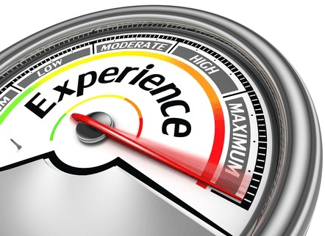What Sales could learn from Customer Experience
September 10, 2015

 I’m very grateful to Bob Thompson of CustomerThink for hosting a very stimulating round table with a group of the UK’s leading customer experience consultants yesterday. It was fascinating to hear what today’s best-in-class organisations are doing to create exceptional customer experiences - and somewhat galling to recognise how much room for improvement the rest of us have.
I’m very grateful to Bob Thompson of CustomerThink for hosting a very stimulating round table with a group of the UK’s leading customer experience consultants yesterday. It was fascinating to hear what today’s best-in-class organisations are doing to create exceptional customer experiences - and somewhat galling to recognise how much room for improvement the rest of us have.
The essence of sales is surely (or ought to be) all about the quality of the buying experience, and there is clearly a great deal that those of us whose primary focus is on acquiring customers can learn from those whose business is primarily about retaining and developing customers…
Technology is only an enabler, never the solution...
One of the obvious lessons is that technology can only ever be an enabler, and never a solution in its own right. Companies habitually invest huge sums in CRM projects whilst ignoring the fact that the acronym originally stood for Customer Relationship Management - and end up with nothing more than an ineffective sales accounting system that is seen by its users as something they are forced to endure, rather than something that is actually going to help them to achieve their goal of succeeding as salespeople.
If we can’t even do something that our internal (sales) customers appreciate as being indispensable to their success, you’ve got to wonder what the odds are on our chances of successfully equipping those same sales people to facilitate their customer’s decision process and improve the quality of their buying experience.
The power of empowerment...
Even worse if our sales process is so rigidly prescribed that it dissuades, prevents or punishes our sales people for using their initiative and applying their creativity. It’s interesting to note that the most respected customer service organisations are the ones that empower and encourage their staff to do the right thing for the customer at all times.
This is much more to do with fostering the right attitudes than it is about implementing perfect systems. It’s about always understanding the ultimate outcome - a satisfied and enthusiastic customer - and empowering every employee to eliminate or navigate around any obstacles that may stand in the way of achieving that.
Eliminating the excuses...
Most importantly, it’s about removing the excuse that the system wouldn’t allow them to do the right thing. It’s about eliminating the ability to blame the system or someone else within the organisation for not being able to make things good. But it requires a particular type of person (or at least a certain set of attitudes) for empowerment to work. And it requires a style of management that believes (having got the right people on board) in the need to trust their team.
How does this apply to the world of selling? Well, there are a growing number of credible analyst reports (one of the most recent from Forrester) that predict that the number of sales people is going to dramatically decline during the rest of the decade. And that certainly true for many simple transactional sales: those sales people are being disintermediated with a vengeance in favour of self-service systems.
Upskilling the sales team...
This will inevitably result a smaller community of sales people - in whom we have higher expectations. Better-informed customers have come to expect more valuable interactions with sales people - and if all they get is some sort of sales automaton who is only capable of spurting out product specifications and prices, they are going to cut the conversation short - and cut the sales person (and their organisation) out from any future buying interaction.
Just as the best call centres stress empowerment and on recruiting high quality people who genuinely care and are capable of going off-script in order to ensure the best outcome for the customer, we need to ensure that our sales team is capable of representing our organisation in a way that does credit to the image we desire in the marketplace.
And frankly, a significant percentage of old-school sales people are never going to be able to satisfy these increasingly demanding expectations. That’s not to say that we can’t teach some of these old dogs new tricks. But there’s an uncomfortably large number of current sales people who, despite all the training we offer them, are never going to make it, either because they lack the innate intelligence or because their ingrained attitudes prevent them.
Customers expect more...
Let’s face it: we’re going to need smarter, more adaptable sales people. Customers expect smarter, more empathetic sales people. We are obliged to give our existing people the chance to show that they are capable of rising to meet these newly elevated expectations. As managers, we’re responsible for setting expectations and creating the environments that enable them to succeed.
But if becomes obvious that some are not going to be able to step up to the mark, can you really afford to allow them to continue to compromise your customer experience? More bluntly, can you afford to have them lose you business (and the future customer service opportunities) you could have won?



Comments